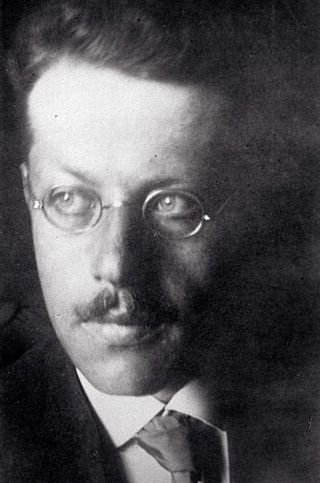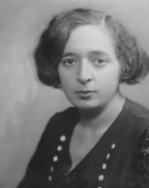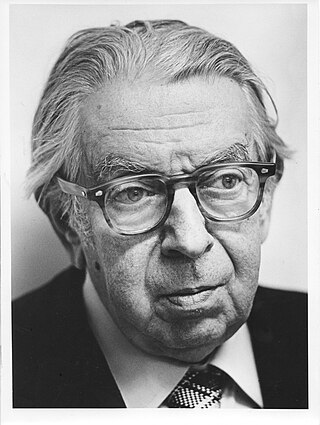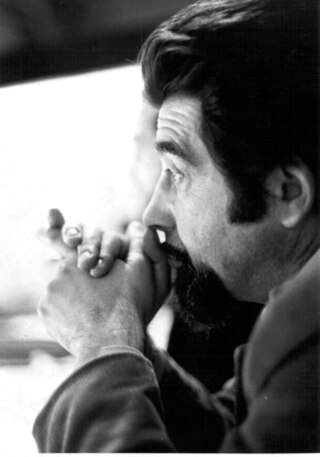
Judaism is an Abrahamic, monotheistic, and ethnic religion. It comprises the collective spiritual, cultural, and legal traditions of the Jewish people, having originated as an organized religion in the Middle East during the Bronze Age. Contemporary Judaism evolved from Yahwism, the cultic religious movement of ancient Israel and Judah, around the 6th/5th century BCE, and is thus considered to be one of the oldest monotheistic religions. Religious Jews regard Judaism as their means of observing the Mosaic covenant, which was established between God and the Israelites, their ancestors. Along with Samaritanism, to which it is closely related, Judaism is one of the two oldest Abrahamic religions.

Martin Buber was an Austrian-Jewish and Israeli philosopher best known for his philosophy of dialogue, a form of existentialism centered on the distinction between the I–Thou relationship and the I–It relationship. Born in Vienna, Buber came from a family of observant Jews, but broke with Jewish custom to pursue secular studies in philosophy. He produced writings about Zionism and worked with various bodies within the Zionist movement extensively over a nearly 50-year period spanning his time in Europe and the Near East. In 1923, Buber wrote his famous essay on existence, Ich und Du, and in 1925 he began translating the Hebrew Bible into the German language reflecting the patterns of the Hebrew language.

Franz Rosenzweig was a German theologian, philosopher, and translator.
Jehuda Reinharz served as President of Brandeis University from 1994–2010. He is currently the Richard Koret Professor of Modern Jewish History and Director of the Tauber Institute for the Study of European Jewry at Brandeis. He is also the president and CEO of the Jack, Joseph and Morton Mandel Foundation. On September 25, 2009, Reinharz announced his retirement as President of Brandeis, but at the request of the Board of Trustees, he stayed on until a replacement could be hired. On January 1, 2011, Reinharz became president and CEO of the Jack, Joseph, and Morton Mandel Foundation.

Gershom Scholem was a German-born Israeli philosopher and historian. Widely regarded as the founder of modern academic study of the Kabbalah, Scholem was appointed the first professor of Jewish mysticism at Hebrew University of Jerusalem.

Trude Weiss-Rosmarin was a German-American writer, editor, scholar, and feminist activist. With her husband, she co-founded the School of the Jewish Woman in New York City in 1933, and in 1939 founded the Jewish Spectator, a quarterly magazine, which she edited for 50 years.

The 1782 Edict of Tolerance was a religious reform of Emperor Joseph II during the time he was emperor of the Habsburg monarchy as part of his policy of Josephinism, a series of drastic reforms to remodel Austria in the form of the ideal Enlightened state. Joseph II's enlightened despotism included the Patent of Toleration, enacted in 1781, and the Edict of Tolerance in 1782. The Patent of Toleration granted religious freedom to the Lutherans, Calvinists, and Serbian Orthodox, but it was not until the 1782 Edict of Tolerance that Joseph II extended religious freedom to the Jewish population.
"Wissenschaft des Judentums" refers to a nineteenth-century movement premised on the critical investigation of Jewish literature and culture, including rabbinic literature, to analyze the origins of Jewish traditions.
Early criticism of Judaism and its texts, laws, and practices originated in inter-faith polemics between Christianity and Judaism. Important disputations in the Middle Ages gave rise to widely publicized criticisms. Modern criticisms also reflect the inter-branch Jewish schisms between Orthodox Judaism, Conservative Judaism, and Reform Judaism.

Nahum Norbert Glatzer was an Austrian and American scholar of Jewish history and philosophy from antiquity to mid 20th century.

Arthur Allen Cohen was an American scholar, art critic, theologian, publisher, and author.

Jewish secularism refers to secularism in a Jewish context, denoting the definition of Jewish identity with little or no attention given to its religious aspects. The concept of Jewish secularism first arose in the late 19th century, with its influence peaking during the interwar period.
Norbert Max Samuelson was a scholar of Jewish philosophy. He was Professor Emeritus at Arizona State University, having held the Grossman Chair of Jewish Studies there. He wrote 13 books and over 200 articles, with research interests in Jewish philosophy, philosophy and religion, philosophy and science, 20th-century philosophy, history of Western philosophy, and Jewish Aristotelians. He also lectured at university-level conferences around the world.
The Bücherei des Schocken Verlag sometimes informally referred to as beliebte Reihe der Schocken-Bücherei with its distinct, uniform style is widely considered "one of the most important manifestations of the spiritual life of Jews in Germany between 1933 and 1938".
Jewish existentialism is a category of work by Jewish authors dealing with existentialist themes and concepts, and intended to answer theological questions that are important in Judaism. The existential angst of Job is an example from the Hebrew Bible of the existentialist theme. Theodicy and post-Holocaust theology make up a large part of 20th century Jewish existentialism.

Steven S. Schwarzschild (1924–1989) was a rabbi, philosopher, theologian, and editor.

Hamagid, also known after 1893 as Hamagid LeIsrael, was the first Hebrew language weekly newspaper. It featured mostly current events, feature articles, a section on Judaic studies, and, in its heyday, discussions of social issues. Published between 1856 and 1903, it first appeared in Lyck, East Prussia and targeted Russian Jews, but was soon redistributed all over Europe and the Jewish world. Although it only had a peak circulation of 1,800 copies, it's primarily remembered as beginning the modern day Hebrew language press. It is hard to estimate its true readership, as in its era one copy would pass through many hands.

Nietzschean Zionism was a movement arising from the influence that the German philosopher Friedrich Nietzsche had on Zionism and several of its influential thinkers. Zionism was the movement for the attainment of freedom for the Jewish people through the establishment of a Jewish state. Friedrich Nietzsche's philosophy was popular among Jewish intellectuals, and therefore incorporated into Zionism effortlessly.
Jewish Lives is a biography series published by Yale University Press and the Leon D. Black Foundation. It was founded in 2006 and the first book was published in 2010.
Hillel Levine is an American social scientist, rabbi, and author. He was Professor of Religion at Boston University, where he served as the first director of the Center for Judaic Studies. In addition to books on Jewish history, he authored studies on social theory, comparative historical sociology, and the social epistemology of Judaism. He also served as Deputy Director for Museum Planning of the United States Holocaust Memorial Council, in which capacity he contributed to the preliminary planning of the United States Holocaust Memorial Museum.












